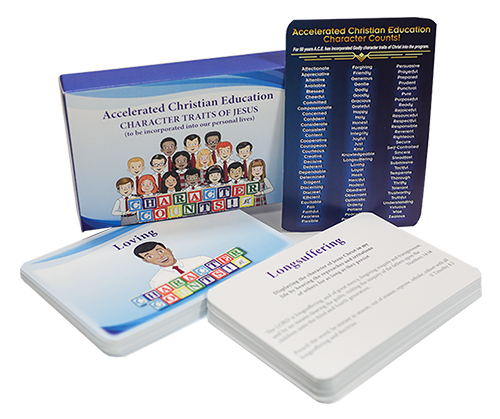One of the driving forces of student success in the A.C.E. program is motivation. Unlike many other educational systems, students using A.C.E. take personal responsibility for their learning. By training them to take ownership of their work, students develop good work habits that they will need in the future. Supervisors face the challenge of how to best encourage this motivation. One tool available to supervisors is A.C.E. Character Counts Merit Certificates.
When the supervisor sees a student demonstrating Godly character—such as hard work, kindness, or a servant’s spirit—he immediately points out the trait the student exhibited and presents a Merit Certificate. All children appreciate someone noticing their good character. If a supervisor looks for the good in his students and then gives recognition for good behavior, he helps reinforce the behavior, which in turn builds good character. What staff encourage and make a priority in students today is what will become a part of their character tomorrow.
The front of the Merit Certificate lists many of the character traits of Christ. The back is blank to allow space for the student’s name, date, and a written reason for the recognition. Staff should show the student the direct correlation between his action and the trait of Christ that he exhibited.
For example:
- When a student helps another student who has fallen on the playground, issue a certificate for “compassionate,” “affectionate,” or “gentle.”
- When a student overcomes a challenging PACE or gets his goals done for a full week, issue a certificate for “diligent,” “faithful,” or “responsible.”
- When a student goes out of her way to welcome and include a new student, issue a certificate for “friendly,” “courteous (hospitable),” “considerate,” or “gracious.”
- When a student shows a good attitude toward a challenging rule or policy, issue a certificate for “submissive,” “flexible,” or “longsuffering.”
- When a student willingly volunteers to assist with a task, issue a certificate for “ready,” “committed,” or “available.”
- When a student tells the truth while knowing that there will be consequences, issue a certificate for “honest,” “integrity,” “righteous,” or “pure.”
Merits serve as a tangible representation of eternal rewards. When earthly goods are not the motivation, students are reminded that honoring the Lord should drive their character. When recognizing students with merits, the emphasis should be on the spiritual aspect of what they have done rather than earning a prize or honor. Staff should be careful not to steer students toward a materialistic mentality. Rather, students should be admonished to produce works that will remain. Lay not up for yourselves treasures upon earth, where moth and rust doth corrupt, and where thieves break through and steal: But lay up for yourselves treasures in heaven, where neither moth nor rust doth corrupt, and where thieves do not break through nor steal. (Matthew 6:19, 20)
It is without question that each staff member as a Biblical educator must also be a person of Jesus’ character—a living epistle, an open book, the type of person after whom children should pattern their lives. As students see Godly character in the lives of staff, they will be motivated to display those traits in their own lives. The things staff do, say, or leave undone will have an eternal effect on the lives of the students.
In addition to Merit Certificates, other character-building resources include the Character Counts: A.C.E. Handbook for Success devotional book and the Character Traits of Jesus flashcards. Educators can incorporate these materials to help students see Who Jesus really is and how they can be more like Him. These materials and several other Character Counts items can be found at store.aceschooloftomorrow.com:



